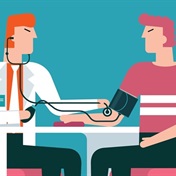High blood pressure is a "neglected disease" and more should be done to fight it by helping people eat better and encouraging doctors to treat it more aggressively, an expert panel said.
The report by the Institute of Medicine, one of the National Academies of Sciences, urged the CDC to promote policies that make it easier for people to be more physically active, cut kilojoules and reduce their salt intake.
High blood pressure or hypertension is easily preventable through diet, exercise and drugs, yet it is the second-leading cause of death in the United States, said committee chair David Fleming, who directs Public Health for Seattle and King County in Washington.
"Hypertension as a disease is relatively easy to diagnose and it's inexpensive to treat," Fleming said. "Yet despite that, many deaths are still due to hypertension, and it costs healthcare systems billions each year in expenses.
"In that context, hypertension is really a neglected disease. There's a huge gap between what we could do and what we are doing," he said.
Cutting salt intake vital
Simple steps like consuming less salt and increasing the intake of vegetables, fruit and lean protein could cut rates of high blood pressure by as much as 22%, according to the report by the Institute, which advises policymakers.
They cited a recent study that found reducing salt intake to 2 300 milligrams per day - the current maximum recommended amount - from 3 400 milligrams a day could cut US health costs by about $17.8 billion each year.
Helping overweight and obese people each lose 10 pounds could cut rates of high blood pressure in the overall population by 7 to 8 %, the group said.
And a program that gets inactive people to exercise could decrease the rate of high blood pressure by 4 to 6%.
Docs often 'fail to follow guidelines'
Doctors typically use generic drugs such as beta blockers and ACE inhibitors to control blood pressure. Lowering blood pressure can cut the risk of stroke, heart attack, heart failure and other conditions.
Fleming said doctors often fail to follow guidelines, which is why many patients do not know they have the condition and are not taking steps to control it.
The group called for the research into the reasons doctors fail to treat high blood pressure, and consider making blood pressure treatment a quality measure in any accreditation program.
The group also asked the CDC to urge the federal Medicare and Medicaid programs and private insurers to reduce out-of-pocket deductibles and co-payments for blood pressure drugs, and to work with the drug industry to simplify the process for patients to get reduced-cost or free drugs.
About half a billion people worldwide have hypertension.
Risk factors include obesity, a sedentary lifestyle and smoking. Chronic illnesses such as diabetes, kidney disease and high cholesterol also can raise one's risk. - (Reuters Health, February 2010)




 Publications
Publications
 Partners
Partners














